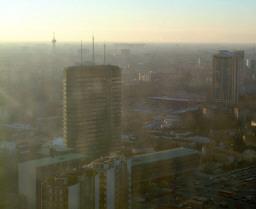A disturbing number of Italian cities are in the grip of a smog crisis, the country's top environmental group warned on Monday.
Issuing its regular update on the state of the nation's air quality, Legambiente said nearly half the 82 cities it has been monitoring since January are regularly breaking safe limits set by the European Union.
The organization particularly highlighted the dangers of PM10, dust particles smaller than 10 micrometers in diameter, able to enter human lungs through the nose and mouth.
Turin and Frosinone, a town south of Rome, were the worst offenders, with dangerous levels reported on 61 days between January 1 and March 31.
Lucca, Vicenza and Modena were close behind, violating guidelines on 59, 56 and 54 days.
Of the country's metropolises, Venice has racked up 52 days, Milan 46, Naples 43 and Rome 37 days.
EU parameters set a daily limit of 50 micrograms of PM10 per cubic metre averaged over 24 hours. The daily limit can be exceeded on up to 35 days per year in order to take account of unusual meteorological conditions.
According to Legambiente, 42% of the 82 cities it is monitoring have already exceeded their annual quota of 35 days.
The organization says these figures are particularly alarming, as they suggest smog levels in Italy will surpass last year's record levels, when 51 of the 63 sites it monitored exceeded EU safe limits.
''This is a truly disturbing picture, with levels of PM10 climbing to worryingly high levels in 2008,'' said Legambiente President Vittorio Cogliati Dezza.
According to Legambiente, private cars are the main culprit for the plummeting quality of Italian air.
Car ownership continues to rise rapidly, said the group, with 62 vehicles for every 100 Italians.
The number of cars has now surpassed the number of potential drivers, while cars are used for a third of all journeys under two kilometres and three quarters of those under 10 kilometres.
''The number of cars is largely to blame but even though this has been acknowledged in various quarters, local administrations are failing to adopt effective solutions as alternatives to private vehicles,'' Cogliati Dezza continued.
''We need more public transport, including buses, trams and metros, as well as initiatives such as car sharing, group taxis, cycling routes and road penalty systems, which encourage public over private transport''.
PM10 is thought to cause over 8,000 deaths in Italy each year.









